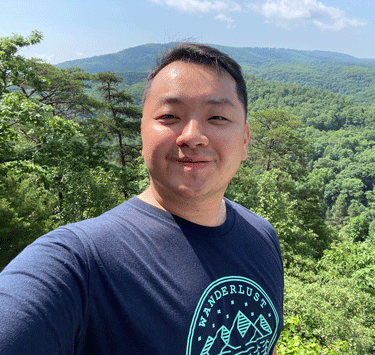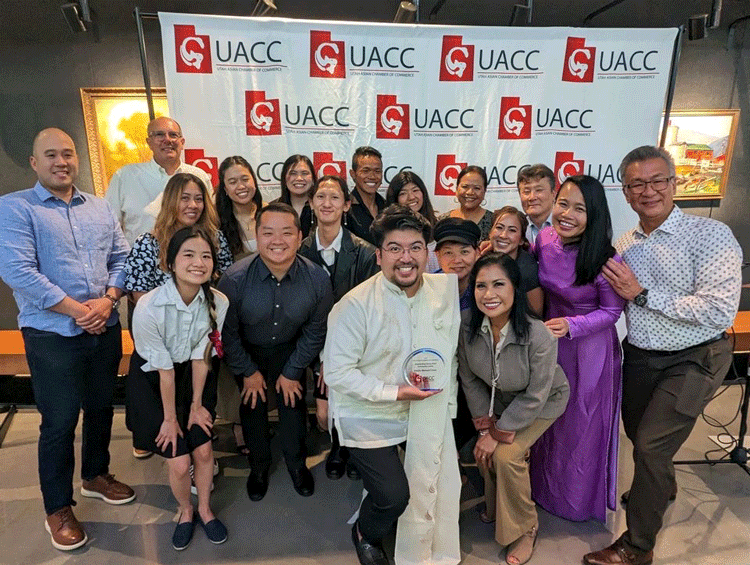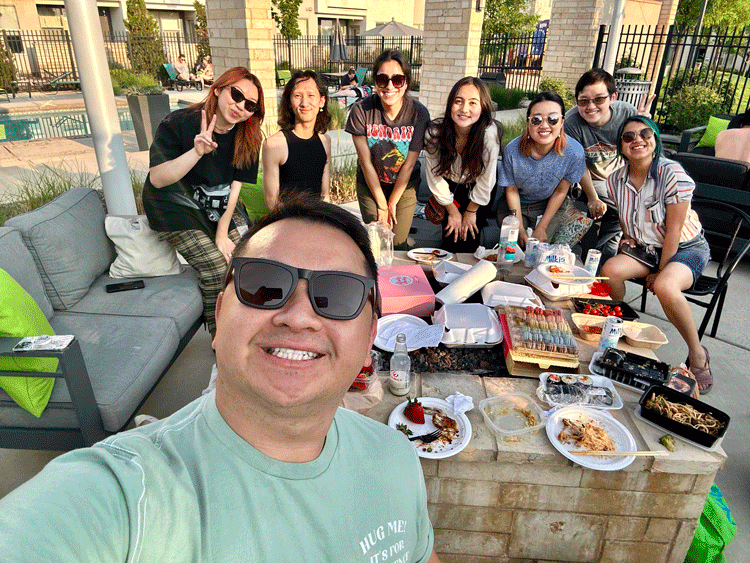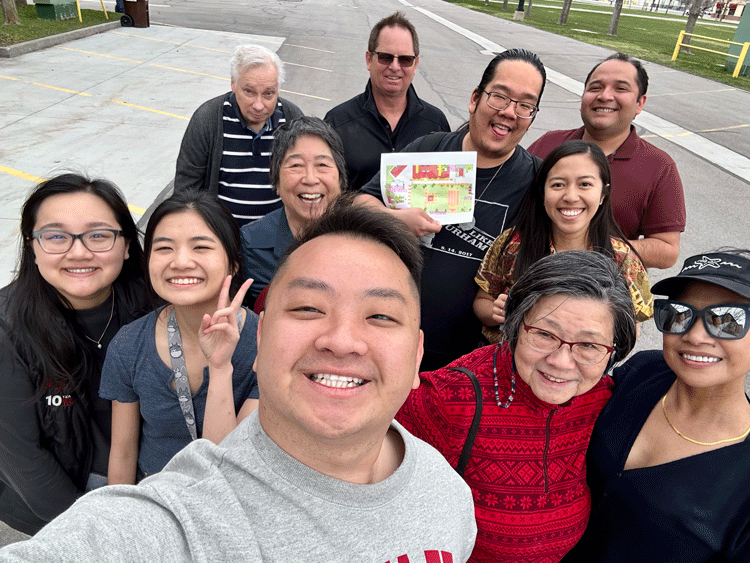Community Engagement Spotlight: Pheej Lauj (Pheng Lor)

Pheej Lauj is a rising second year student and a Mellon Community Engagement Fellow. He has partnered with OCA Asian Pacific Islander American Advocates Utah, the Utah chapter of a national Asian American, Native Hawaiian, and Pacific Islander advocacy organization, for his fellowship. In this role, he aims to fill gaps and serve as a liaison between the Asian and Pacific Islander (API+) community and the local environmental movement. He has been busy planning the upcoming Utah Asian Festival happening June 3, and he has recruited various local environmental organizations to table at the festival for the first time. He is also planning environmental-themed events for the API+ community, such as outings with the Jordan River Nature Center and waste education initiatives. Pheej recently received a Sustainable Campus Initiative Fund (SCIF) grant from the U of U Sustainability Office to support his efforts on recycling and waste disposal with the API+ community.
Pheej’s thesis interest explores the roles of community and stakeholder engagement to inform strategic and effective science communication, specifically with the NSF-funded Coastal Ocean Assessment for Sustainability and Transformation (COAST Card) project. Pheej is Hmong American and was born and raised in Fresno, California. He completed his undergraduate at UC Berkeley with an interdisciplinary degree in Conservation and Resource Studies. Since, he has held various roles in the education and environmental non-profit sectors. His background and passions include plastics reduction, circular economy advocacy, and equity-framed community organizing.
Brooke: What moved you to choose OCA as your fellowship partner?
Pheej: OCA promotes civic engagement while celebrating cultural uniqueness and bringing community together. I thought that was beautiful in a state that has a vibrant API+ community. I chose OCA as opposed to an environmental centric organization because I think there's liaison work that is missing and crucial. I wanted to serve as a bridge to create more effective community engagement and representation across communities and movements for social and environmental justice. I had informational interviews with several environmental and conservation organizations throughout the Salt Lake Valley and learned that there is a huge gap in programs and services for Asian, Asian American, and Pacific Islander communities. Obviously, that didn't sit well with me. But I was also not surprised. I come from a community organizing background in California and previously worked for an environmental nonprofit and see a consistent gap in engagement with Asian, Asian American, and Pacific Islander communities across the nation. From observation, there are few environmental organizations serving API+ communities. So, I decided my best approach may be to serve as an environmental sustainability liaison to OCA and serve as a cultural and community liaison to environmental groups.

Brooke: Will you talk more about that? What is the value of this relational and liaison approach to your work?
Pheej: Identifying as Hmong American, and identifying within the Asian American umbrella, I think there are assumptions about Asian Americans. This fellowship gives me time to truly get to know the community, to be observant, to listen. If I don't find spaces where API+ community members are being heard, I'm asking how I can create those spaces. What are the gaps? What challenges or issues need to be addressed? From my observations, there seems to also be few API+ leaders in the environmental workforce and movement here in the Salt Lake Valley. I've learned that a lot of API+ young leaders interested in the environmental and sustainability field don't feel welcomed. They don't feel there is opportunity for them to be a part of environmental work in a way that is economically feasible and in a way that their identity is accepted and celebrated. OCA's work ensures the community has an organization that will advocate for them, whether that's around issues of racial discrimination or cultural violence. That's a growing theme in the environmental movement too. So, how do we more inclusively encourage participation in the environmental movement? Fostering inclusion includes financial investments. There's a lot to showing up that's often not recognized. We need to talk about economic opportunity and feasibility for participation, things like stipends, public transportation, etc. These intersections of social and environmental challenges need to be tackled.
Brooke: What are the events and community conversations you're facilitating, hosting, and organizing to address these gaps and build relationships?
Pheej: I think first and foremost, I am inviting API+ community members who are interested in environmental and climate justice work to just be together. I think that's the best start to get to know each other's values, interests, and experiences as locals to Salt Lake and community members with immigrant and refugee histories. I think that plays into how we discuss the environment and climate change. I've recently been primarily bringing younger adults together. They're University of Utah students, recent college alumni, and community activists. We are bonding over food. A lot of the conversations center on social injustice across the Salt Lake Valley and how those issues intersect with our own identities. It's also a chance for us to hear one another's struggles alongside our interests, our passions, and our ideas surrounding change.

From there, I'm supplementing community events that have been happening and trying to understand how to optimize this liaison role between API+ communities and environmental organizations doing great work here in the Salt Lake Valley. As I lean on the expertise of the community, I'm supporting various events, including the 46th Utah Asian Festival. This year, I have invited or reinvited several organizations like the USDA NRCS, Salt Lake City Department of Environment, Jordan River Nature Center, and HEAL Utah. It's some of these organizations’ first time to have tables at the Utah Asian Festival. I also have supported various events throughout API+ heritage month in May, including the Asian and Pacific Islander Heritage Month 5K Solidarity Walk, which for the first time is also partnering with the Jordan River Nature Center. The 5K will start and end at the JRNC. It's a great opportunity for the community to learn about the Jordan River Nature Center, their conservation efforts, their decolonial work, and their intentions to mold the nature center to be community centric and community serving.
I'm hoping this will lead to similar collaborations in the future. The JRNC has been an absolute wonder of an organization to work alongside. I'm currently planning kayaking and canoeing trips on the Jordan River led by JRNC staff for API+ community members. We hope this will be an intergenerational space for youth and elders to engage with one another, connect with wildlife, learn about the Jordan River, and interact with the ecosystem in a way that perhaps the community have, or haven’t, done yet. I think it's exciting and necessary to expand recreation, conservation, and sustainability education to the API+ and other underserved communities.

Brooke: You also just received a SCIF grant to raise awareness and progress proper waste disposal among the local API+ community. How did this interest in waste start and what excites you about incorporating this into your Mellon Fellowship?
Pheej: I think my passion and investment in all things relating to waste ties back to my upbringing. I grew up in Fresno, and my backyard was always filled with glass containers, plastic containers, plastic jugs, etc. That's because my parents recycled religiously. We would host what in Hmong we call "ua neeb,” which are like spiritual ceremonies where family members and friends convene and we eat and drink, so there end up being a lot of plastic bottles and cans involved. My family would eventually have plastic bins filled with aluminum cans, bottles, and jugs in our backyard. Then every six months, we would tie it all up in big plastic bags. The bags would be like six feet tall, they were huge! We'd take them to the local recycling center, and then we'd receive the California Redemption Value, or CRV, for those materials. That was always a source of income for my parents, which was very helpful. As a kid, if you helped pack up and transport the recyclables, my parents would give you like, $10, $20, $30 depending on how much they received. They usually get $200-$300. My dad would also collect scrap metal. He would recycle it and be optimistic that he'd get a good return, but he'd get like $3 back and say, "I think they cheated me, but I didn't know how to communicate." I think a lot about my childhood and how prominent recycling was.
I think there's a lot of issues with consumerism. A lot of the waste that isn't recovered by local governments is littered in streets and sewage systems. In many cases that waste ends up in the ocean, which pollutes marine ecosystems and marine life. It also eventually makes its way to other countries through the export and import of waste in the Global South, for example. There are a lot of people in other countries sorting waste from the US and other “developed” countries. I think everything is wrong with that. A lot of times people don't realize these interconnected threads. The issue starts with oil extraction, because crude oil is one of the main sources of plastics production. Most people don't realize how extensive the lifecycle of a plastic bottle is from production to consumption to potential for recovery. Because of all these complex issues, I am an advocate for more circular processes that imagine reuse and other sustainable alternatives in communities.
My experience working on plastics reduction, zero waste, and circular economy has centered on community engagement. But there's a lack of direct outreach and engagement with Asian American and Pacific Islander communities. That's why I am super excited to focus on activating and supporting Asian American and Pacific Islander communities in Salt Lake in recycling, reuse, zero waste, and circular economy knowledge. I feel like in a lot of Asian households, there's always a drawer full of plastic bags. Everybody always asks, "Where's the bag of plastic bags?" There's a lot of reuse of plastics and similar hard-to-recycle material. So that's already happening in the community and is already contributing to this larger mainstream movement of reuse.
Brooke: What are the specific ways you plan to incorporate recycling and waste disposal education into your work with the API+ community?
Pheej: At the Utah Asian Festival, we have over 30 food booths with local Asian American and Pacific Islander businesses. No doubt, there is anticipated to be many forms of waste, from food waste to plastic waste. So, I identified an opportunity to help ensure there is more proper waste disposal. I've formed the Green Team for the Utah Asian Festival, and they'll be making rounds near the the trash and recycling bins to educate participants as they are ready to dispose their waste, for example. I also am glad to have the Salt Lake City Department of Sustainability and their waste education team be present.
I am also planning tours of materials recovery facilitates to provide the local community an opportunity to see what happens with waste. I think touring those facilities will provide a greater perspective and visual experience on waste sorting and recyclability of materials after it leaves a residential area. With my Mellon Fellowship funding and the SCIF grant, I'll be able to provide transportation and meals for community members who participate. I hope this will serve as a ripple effect for community members to think more critically about waste generally and feel agency to advocate for better recycling and waste recovery efforts in the future.
I hope to achieve increased public knowledge around waste education in general. What we learn about recycling from mainstream knowledge might not be entirely true because there are many different recycling haulers even within the Salt Lake Valley. The differences across haulers can complicate things and such nuances are not easily understood by the public, nor are they effectively communicated to the public enough. That feeds into my larger intent to create a bridge between sustainability resources and the API+ community. This is the start, and it's exciting. I've always dreamed of doing or being a part of something like this, so it feels great. I'm grateful for the opportunities with the Mellon Community Engagement Fellowship and the SCIF grant funding. I hope this will identify more possibilities and avenues for inclusive and culturally considerate community engagement around these issues.
Categories
Featured Posts
Tag Cloud
- community engagement (12)
- outdoor recreation (2)
- outreach (1)
- alumni (3)
- admissions (1)
- faculty (8)
- practitioner-in-residence (2)
- utah award in the environmental humanities (1)
- environmental justice (2)
- STEMCAP (2)
- STEM (2)
- water (1)
- communications (2)
- humanities (1)
- Taft-Nicholson Center (1)
- director (3)
- student (5)
- API (1)
- Asian American (1)
- Pacific Islander (1)
- graduation (1)
- research (3)
- thesis (1)
- project (1)
- Indigenous (1)
- Shoshone (1)
- Great Salt Lake (2)
- Bear River (1)
- land acknowledgement (1)
- STEMAP (1)
- public engagement (1)
- science (1)
- science communication (1)
- Wilkes Center (1)
- climate change (1)
- climate science (1)
- climate policy (1)
- policymaking (1)
- funding (1)
- storytelling (1)
- radio (1)
- journalism (1)
- racial justice (1)
- outdoor education (1)
- writing (1)
- non-fiction (1)
- energy extraction (1)
- queer (1)
- reading (1)
- environmental education (1)
- affect theory (1)
- media (1)
- rhetoric (1)
